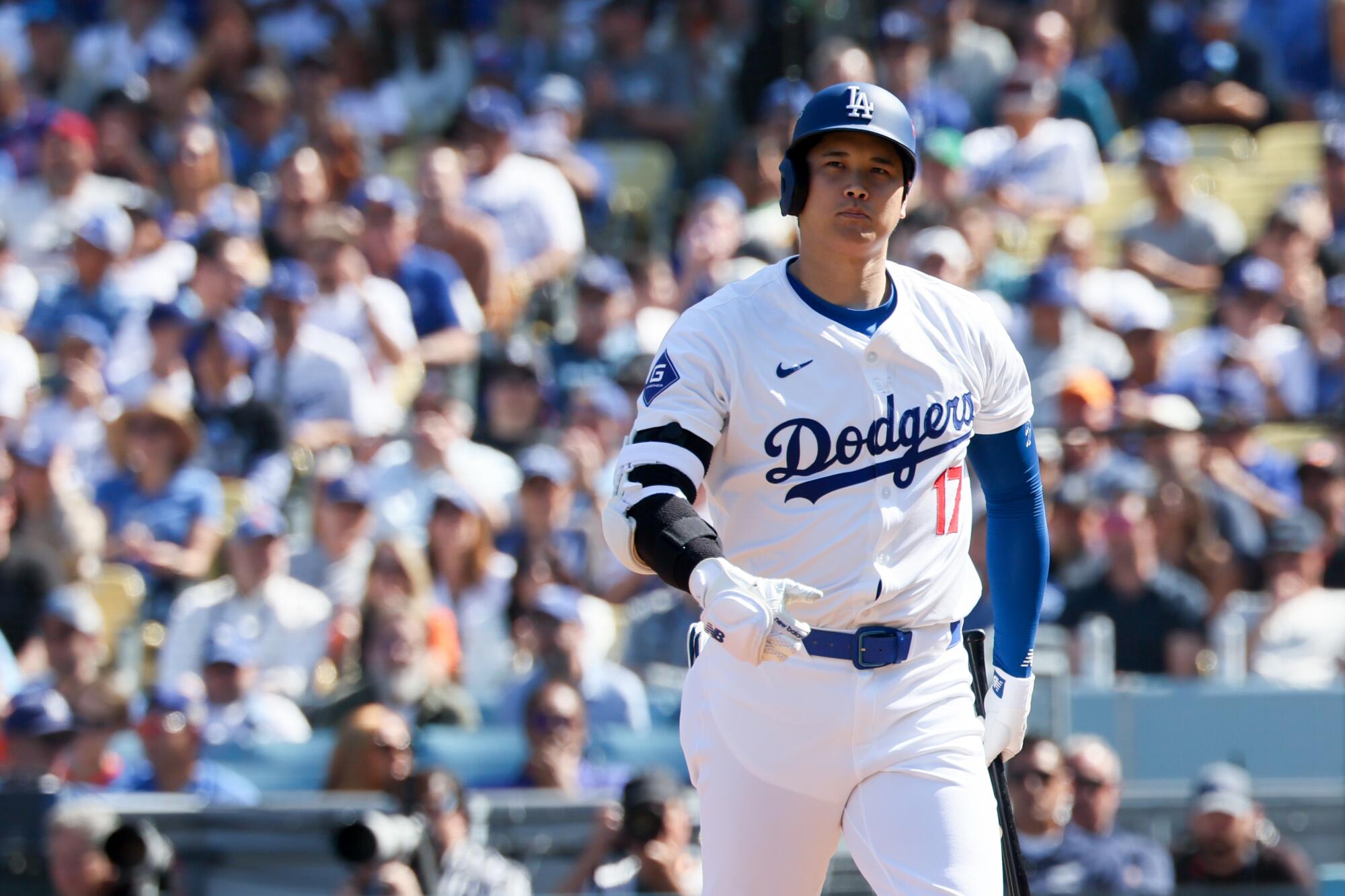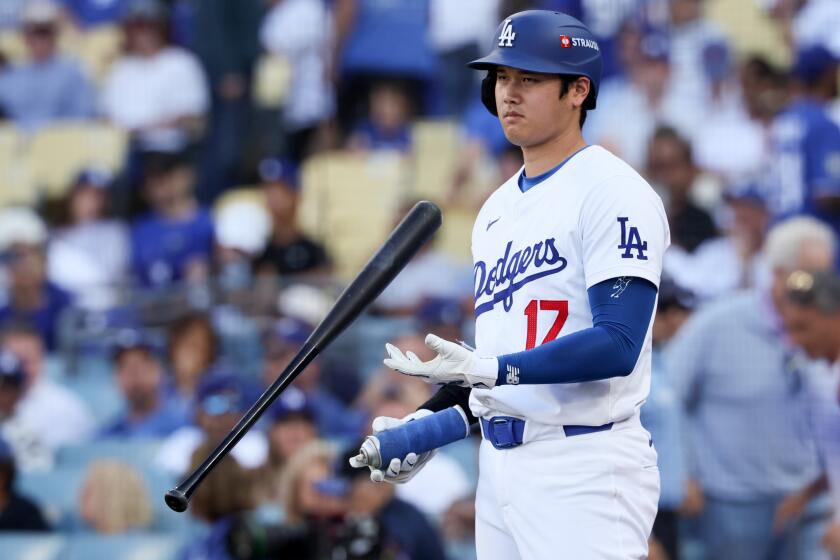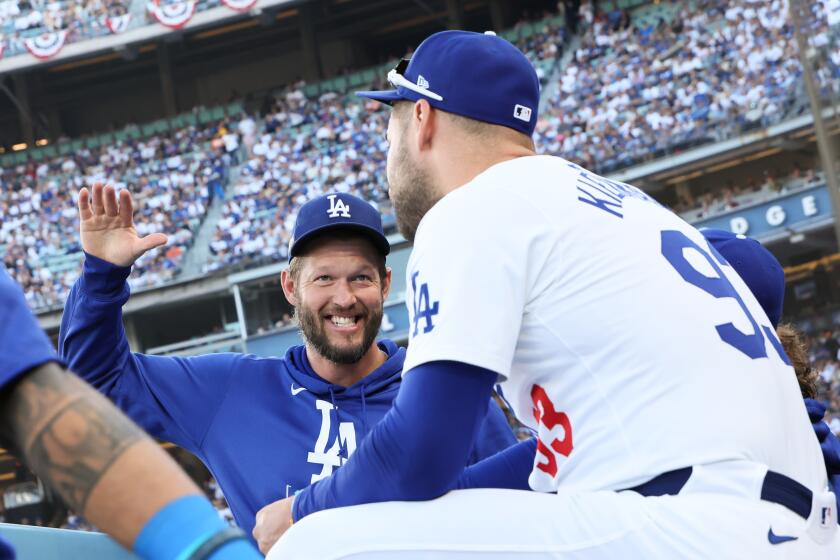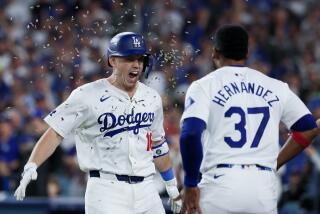
- Share via
In theory, the Dodgers’ decision to go with a bullpen game in Game 2 of the National League Championship Series on Monday made sense.
The club’s lockdown relief corps had just gotten a rare night off, thanks to Jack Flaherty’s seven-inning gem in Game 1. Walker Buehler was an option to make a more traditional start, but the Dodgers wanted to save him for Game 3 in New York instead.
So, they planned to run back the pitching plan that worked so well in Game 4 of the NL Division Series, when they staved off elimination by throwing a group-effort shutout from eight different pitchers.
The only problem: The Dodgers declined to deploy their highest-leverage relievers early in the game this time.
The Dodgers entered NLCS Game 2 looking practically unbeatable, but the New York Mets buried any notion of an easy series for L.A. with their 7-3 victory.
And before they could ever get to them, the score was already out of reach.
In a 7-3 loss to the New York Mets in Game 2, the Dodgers’ record-tying 33-inning postseason scoreless streak ended quickly — and in calamitous fashion.

Right-hander opener Ryan Brasier gave up a leadoff home run to Francisco Lindor in the game’s first at-bat. Then, the real disaster unfolded in a five-run second inning against rookie right-hander Landon Knack.
“Obviously,” Knack said, “I didn’t set the tone very well for everyone else.”
During last week’s Game 4 win over the Padres, Knack — the former second-round draft pick whose solid rookie season wasn’t enough to warrant full starting pitching duties in the playoffs — didn’t take the mound until the ninth inning, when the Dodgers were nursing an eight-run lead.
But on Monday, he was the first pitcher to trot out of the bullpen. Not Anthony Banda (who entered in the second inning of Game 4 in the NLDS). Not Michael Kopech (who was summoned for the third inning that night). And not any of the team’s other dominant relievers, either.
In hindsight … it was a costly decision.
After giving up a leadoff single and putting another runner on base with a walk, Knack never managed to stop the bleeding. Tyrone Taylor ripped an RBI double down the left-field line for one run. After an intentional walk to Lindor loaded the bases, Mark Vientos worked a nine-pitch at-bat that ended with a grand slam.

Just like that, it was 6-0 Mets.
“I just felt today he wasn’t sharp overall, specifically the secondary [pitches],” manager Dave Roberts said, noting that Taylor’s double came on a hanging curveball, and how Vientos’ homer off a full-count fastball came only after Knack failed to put the at-bat away with four-straight two-strike sliders.
“We had an opportunity to minimize damage … and then you make a mistake with your heater,” Roberts added. “That was a big hit, clearly.”
Unlike last week, Roberts said the plan Monday was always to use Knack early in the game.
The team knew it would need at least a couple of innings from him, having to compensate for the absence of two key pieces from last week’s bullpen game: left-handed reliever Alex Vesia (out this series with an injury) and right-handed reliever Daniel Hudson (unavailable Monday after pitching in Game 1).
And even once Knack started scuffling in the second, Roberts said he had no choice but to ride out the inning — feeling handcuffed by a potential lack of pitching options later in the game otherwise.
“You go to anyone else [in that inning],” Roberts said, “we’re not going to [have enough pitching to] be able to finish the game.”
Things unfolded so poorly, the Dodgers avoided using any high-leverage arms entirely, outside of an 18-pitch fourth inning from Banda (their only left-hander this series with Vesia out).
Brent Honeywell Jr. pitched three scoreless innings. Edgardo Henriquez gave up one run over the final two.
As a result, the team’s top three relievers — Kopech, Blake Treinen and Evan Phillips — will enter Game 3 on four days’ rest.

To Roberts, that was at least one silver lining from Monday.
But it did little to counter the series’ sudden change of momentum.
“It’s going to be a long series,” outfielder Mookie Betts said. “We expect it to be a long, tough series.”
Granted, poor pitching wasn’t the only reason the Dodgers lost Monday.
Their bats went cold against Mets left-hander Sean Manaea, who entered the game with a career 7.09 ERA against the Dodgers, but held them scoreless until a Max Muncy solo homer in the bottom of the fifth.
And even after they got back within 6-3, scoring a couple runs in the sixth after two miscues from the Mets infield, Kiké Hernández twice came up empty while representing the tying or go-ahead run, rolling into a bases-loaded double play to end the sixth before flying out with two aboard to end the eighth.
“Got really good pitches to hit,” Hernández said. “Just didn’t come through today.”
Now, with the series’ next three games to be staged at Citi Field, the Dodgers can only hope their starting rotation avoids the same fate.

On paper, the Dodgers won’t hold the pitching advantage in Game 3, when Buehler (who went 1-6 in the regular season with a 5.38 ERA, and gave up six runs in his lone NLDS start) will duel against Luis Severino (who has followed up his 11-7 record and 3.91 ERA in the regular season with a pair of quality starts in the playoffs).
And unless the Dodgers get the good version Yoshinobu Yamamoto the following day (the one that pitched five shutout innings against the Padres in Game 5, rather than the version that was knocked around for five runs in Game 1), the Game 4 matchup could be a toss-up as well, with Mets veteran Jose Quintana having yet to allow an earned run in 11 postseason innings after a 10-10 record and 3.75 ERA in the regular season.
The good news for the Dodgers is, with a rested bullpen, they should be well-positioned to protect a lead in either game.
Game 5 also presents a more favorable proposition, when Flaherty will be lined up to pitch for the second time this series.
“We’re very well-equipped,” catcher Will Smith said of the prospect of a longer series. “A ton of roster depth, really one through 26. It’s going to be a fight. We knew it was going to be.”
Before Game 2 of the NLCS, Kershaw told the Fox Sports pregame show that he is planning to play in 2025, when he can exercise a player option to stay with the Dodgers.
But, as Monday showed, the Dodgers can no longer look at a potential bullpen game later in the series as any sort of guarantee.
“It all is great when it works well and guys are throwing up zeros, but you’re still facing really good ball clubs,” Roberts said. “When you’re on the margins and you lose a couple guys and guys aren’t available” — like Vesia and Hudson — “you’ve got to figure out how to get out somehow.”
On Monday, that duty landed at the feet of Knack.
He failed to deliver. The rest of the game script was tossed. And the NLCS now heads to New York, all square at one game apiece.

More to Read
Are you a true-blue fan?
Get our Dodgers Dugout newsletter for insights, news and much more.
You may occasionally receive promotional content from the Los Angeles Times.









